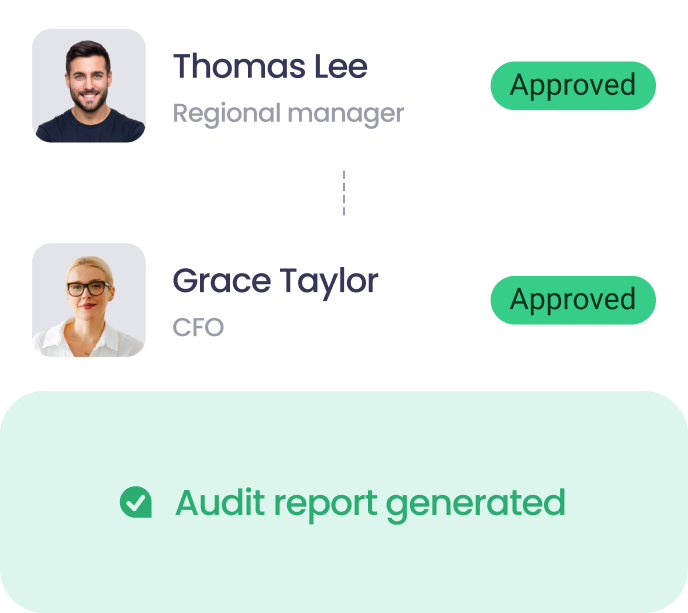
Internal financial controls: A guide to the future accounting

As businesses grow, they can benefit from strengthening financial controls and approvals to prevent, detect, and correct any financial issues before they arise.
As businesses work to plug leaks in spending in the face of a challenging financial outlook, new accounting technology steps in to tighten the grip on internal financial controls.
With a squeeze on company profits, businesses are looking for smarter ways to manage their budgets. With that has come greater realisation that internal financial controls have a big part to play. Here we share the trends in how the accounting industry responds to this pressing issue and the accounting technology playing a significant role in this shift in focus.
Why Internal Financial Controls Matter
Streamlining how businesses buy from suppliers affects the bottom line in more ways than one. A growing emphasis on internal controls offers ways to respond to increased regulatory scrutiny and evolving accounting standards.
- Financial information can be trusted – controls ensure financial information’s accuracy, reliability, and integrity.
- Assets better protected – businesses can monitor and track the flow of assets, reducing the risk of mismanagement or loss.
- Fraud deterrence – separating the roles of approving purchases, receiving goods, and making payments helps prevent employees from misusing company funds or diverting assets for personal gain.
- Better compliance with regulations – can meet tougher ATO, Anti-Money Laundering (AML) and accounting standards around financial reporting and disclosure with more accurate records and simpler auditing procedures.
.png?width=1248&height=767&name=Component%2062%20(1).png)
Business and accounting are adapting to pressure with new tech
There’s now plenty of tech in the clever accountant and bookkeeper’s scope, from automated accounting systems and data analytics to cloud-based solutions. Different countries are quick to innovate, while others are more cautious. All though are welcoming the tech discussion, for it achieving tighter financial controls in a few ways:
- Efficiency – Clearer rules and processes enhance accuracy and real-time monitoring.
- Risk management – New tech is making it easier to protect finances against fraud, cybercrime, data mishandling and compliance errors. This ultimately enables protection from penalties, legal liabilities, or reputational damage.
- Meeting regulatory changes – Stricter financial controls enable accountants to keep pace with a fast-moving regulation landscape. Rules are changing to meet the challenges of digital innovation, Anti-Money Laundering (AML), data privacy, tax priorities, and financial disclosure.
.png?width=1248&height=767&name=ifc_%20Component%2062%20(2).png)
Common Challenges in Setting Up Internal Financial Controls
Building strong financial controls isn’t always straightforward. Whether you’re a growing business or an established organisation, you may face some familiar challenges. Here’s a practical look at how to approach them:
Resistance to Change
It’s natural for people to feel hesitant about new processes or systems. Change often brings questions like, “Will this disrupt my work?” or “Is this really necessary?”
Involve your team early on. Explain why changes are being made and how they’ll benefit everyone – such as saving time or reducing repetitive tasks. Offer training so that everyone feels confident using new processes.
Integration with Existing Systems
Adopting new financial controls sometimes feels complicated, especially if your current tools don’t easily connect.
Start by mapping out your workflows and identifying where bottlenecks can potentially occur. When choosing tools, look for those that offer integrations with your existing systems to keep processes simple and easy. Testing updates in small phases can also help spot issues before they grow.
Budget Concerns
For smaller businesses, cost is often top of mind. It’s easy to think, “Do we really need this now?”
Financial controls are an investment in your business’s future. Start with the basics, like tracking spending limits or introducing an approval workflow. As your business grows, you can expand these systems to meet new needs.
Keeping Up with Regulations
Compliance requirements, like GDPR or AML, are always evolving, and keeping up can feel like chasing a moving target. Falling behind doesn’t just create headaches—it can lead to fines, reputational damage, and extra stress for your team.
Proactive planning is key. Set reminders for important deadlines and regulatory updates to avoid last-minute scrambles. Automating compliance-related tasks, such as maintaining clear audit trails, can also help. These trails provide a detailed record of approvals and financial actions, making audits simpler and reducing the chance of errors.
Data Security Risks
Cybersecurity is a growing concern, particularly when handling sensitive financial data like bank details, supplier information, and approvals. Protecting this information is of utmost importance for maintaining trust and avoiding costly breaches.
Limit access to approvals, use secure logins, and train your team to spot phishing attempts. Tools like ApprovalMax add security with role-based access controls and audit trails that guarantee that only authorized users have access to the sensitive financial data. Combining these steps with secure technology keeps your processes protected and efficient.
.png?width=1248&height=768&name=ifc_%20Component%2062%20(3).png)
How Technology Strengthens Internal Financial Controls
ApprovalMax has satisfied a pent-up demand for tighter internal financial controls with technology that makes it clearer to assign responsibilities and keep decision-making in check. The proper asset management measures work to safeguard and prevent unauthorised use. It facilitates:
Segregation of duties
This is about separating responsibilities and duties among individuals or departments. Businesses can reduce the risk of fraudulent activities by dividing tasks such as authorisation, record-keeping, custody of assets, and reconciliation. For example, separating the roles of approving purchases, receiving goods, and making payments helps prevent employees from misusing company funds or diverting assets for personal gain.
Documentation of policies and procedures
Financial controls establish clear policy guidelines for cash management, inventory control, and procurement processes. Standardised procedures help ensure consistency, accountability, and compliance with internal policies and external regulations. By documenting these processes, businesses can monitor and track the flow of assets, reducing the risk of mismanagement or loss.
Stricter budget and accountability controls
With clearer approval processes for expenditures, investments, and other asset-related transactions, assets are used for legitimate business purposes. There is appropriate oversight and accountability. Authorisation levels, budgetary controls, and expenditure limits help prevent unauthorised or excessive spending that could deplete assets or increase the risk of financial loss.
Accuracy and compliance
Automation helps reduce human errors, ensure consistent processes, data protection, and provide real-time visibility into asset movements and transactions.
The Numbers Behind Internal Financial Controls
If you’re wondering whether financial controls are worth the effort, the numbers speak for themselves. Here’s what recent research tells us about their impact:
Taking the Next Step: Building Better Internal Financial Controls
The next step is to investigate technology for more robust controls. With the tech comes the solution to fix these pressing issues. Accounting firms stand to benefit as much as their clients.
The natural next trend is more and more will be adopting these solutions. By staying ahead of technological developments, businesses can maintain a competitive edge, improve operational effectiveness, and ensure their financial controls remain robust in the face of changing business risks.
Ready to Simplify Your Approval Process?
Konstantin Bredyuk, co-founder of ApprovalMax, began his entrepreneurial journey in 2016 to help SMBs scale faster. Driven by a mission to help businesses build strong financial controls, he leads by example, proudly propelling ApprovalMax’s growth with dedication and hands-on leadership.
Set up a system of checks and balances for your financial operations.
Multi-step, multi-role approval workflows for financial documents.

Auto-generated audit reports for each approved item.

Get alerts for fraudulent activity and protect against it happening.
Leave printing in the past with fully digitised workflows.



